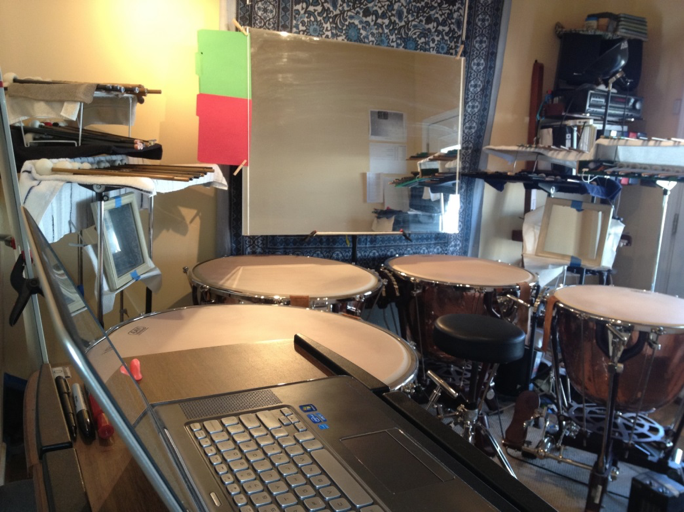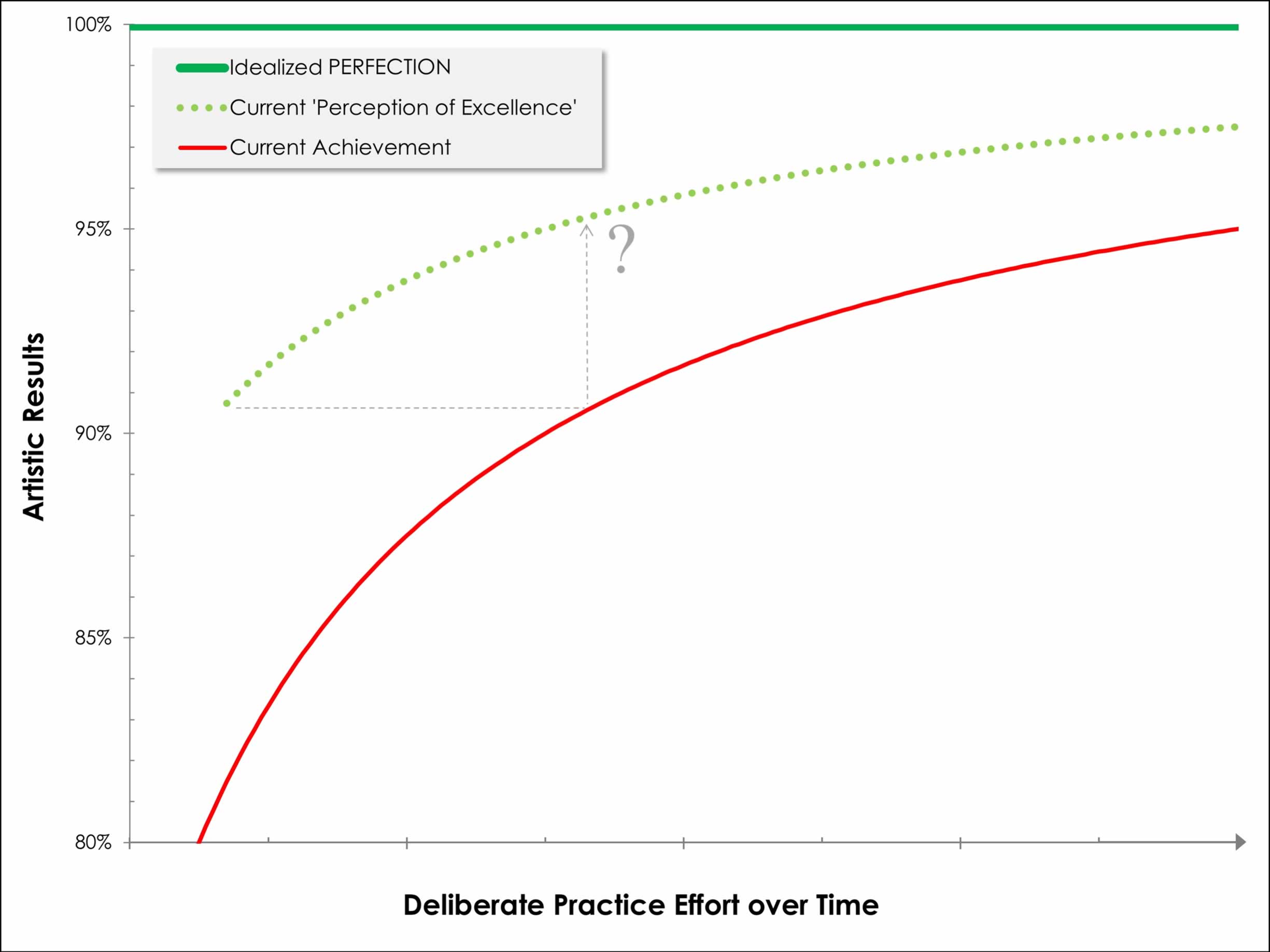(The Attributes of Deliberate Practice: Commitment, Motivation, and Willpower)

“It’s damn cold. My fingers are numb, and useless. With each breath, the intake is shocking, as if my lungs had already forgotten the frigid air inhaled only seconds before. I’m hunched with my arms curled around my knees in a desperate play to lose as little body heat as possible. And I’m so tired. Not just from the lack of sleep, but from the journey…this seemingly endless path. Tortuous and punishing. In moments like these, it’s hard not to ask ‘Why the hell am I doing this?'”
Oh — sorry! That might have confusingly seemed like the caption to the scene above — the Teton Crest Trail winding through the snow fields of Grand Teton National Park. My bad, let me clarify: that was a retroactive journal entry from January 3rd, 2012, 5:45 am, as I climbed the steps down into my unheated practice cave, drinking coffee as quickly as possible while anxiously waiting for the space heaters to raise the temperature.

That was, more or less, the scene of most of my mornings, pushing myself to get in a couple hours of practice before I left for work, and wishing the previous owners of my house had seen fit to run the heating ducts all the way to the addition in back — the addition that would become my timpani practice cave.
No, the tetons journal entry went more like this:

“It’s damn cold. The dark clouds have been threatening for over two hours; now they’re finally making good on those threats. We’d been climbing the north side of Alaska Basin when we felt the first drops. Still several miles below Hurricane Pass, we’ve wisely chosen to stay below the tree line, taking cover in a copse of pine as the sky flashed and thunderous reports ricocheted between the mountains. But this only slightly mitigates the punishing hail and icy rain. The pelting from these little freezing bullets makes me realize the waterproofing on my jacket shell has worn off, and I feel the dampness seeping down into my remaining layers. This is the worst cold — wet cold. The shivering convulses my whole body. With each breath, the intake is shocking, as if my lungs had already forgotten the frigid air inhaled only seconds before. I’m hunched with my arms curled around my knees in a desperate play to lose as little body heat as possible. And I’m tired from the journey…this seemingly endless path. In moments like these, it’s hard not to ask ‘Why the hell am I doing this?’”
It’s Not Fun
MAN…those were cold and difficult mornings.
But as the old saying goes, “if it was easy, everyone would do it!” And of course, if everyone did it, then:
- The backcountry of our nation’s peerless national parks would be overrun by tourists, and
- In music, sports, and just about everything else, there would be no way to “distinguish the best from the rest.”
Deliberate practice is not meant to be “fun.” When done right, it’s not inherently enjoyable. Think about the recipe I’ve been laying out in the preceding posts:
- You’re focusing specifically on things you’re NOT good at. You’re ripping yourself out of your comfort zone, zooming in on your warts with a high-powered microscope, and struggling to tame your ego in the process.
- You’re enlisting the aid of (often intimidating) teachers to dig into your known problems and to point out new failings you’d never even considered.
- You’re using self-recording feedback to unflinchingly catalogue your manifold deficiencies.
- You’re repeating things obsessively, consuming all of your available focus and concentration.
- …and you’re doing it until you’re completely exhausted.
Yeah…it’s not necessarily an enjoyable walk in the park. And it’s not supposed to be. In Peak, Ericsson writes about his study of spelling bee competitors, noting that even the best spellers “didn’t like studying at all. None of them did…. The hours they had spent studying thousands of words alone were not fun; they would have been quite happy to do something else. Instead, what distinguished the most successful spellers was their superior ability to remain committed to studying…. How do you keep going? That is perhaps the biggest question that anyone engaged in deliberate practice will eventually face.”
However, even though deliberate practice is neither “fun” nor inherently enjoyable, it should still be ultimately rewarding and gratifying. Much like a grueling trek up a snowy mountain, you might be suffering in the moment. You might be cold, wet, and exhausted. But man, it is SO worth it. It’s incredibly gratifying. The payoff is in the process, and the process of those hikes brings me incomparable fulfillment.
But I get it: rigorous backcountry trekking is not for everyone. Nor is orchestral instrument performance. This is an essential piece of philosophy for younger musicians to absorb: not everyone is cut out for this life. Nor should they be! Your own interests and desires — your compatibility with a career path — these are much more important than the expectations of others. If playing an instrument is not fulfilling for you, then you probably shouldn’t be on this track. And that’s perfectly okay.
However, if it IS fulfilling to you, then by all means: proceed! But as another old saying goes, “forewarned is forearmed.” Proceed wisely, anticipating the terrain in front of you, keeping your eyes on the skies for the inevitable storm clouds that will develop, and knowing that the path is so challenging and so demanding that you really need to love it. And you need to love it for the right reasons.
The Only Sustainable Motivation
“Commitment.” “Drive.” “Motivation.” “Tenacity.” “GRIT.” These words are often tossed around when talking about a career in music. But what do they really mean? And especially, what do they mean at the level of day-to-day experience? What do they mean for our implementation of deliberate practice? How do you keep going?
In previously discussing the attributes of deliberate practice, I noted that “applying years of solitary deliberate practice requires incredible commitment and drive.” This seems like an obvious assumption, but I would suggest that this one assumption creates more long term problems for instrumental musicians than just about anything else — more than playing-related injuries, more than tinnitus, and more than the flawed trope that “classical music is dying.” That’s because leaving this assumption unexamined and skipping over the necessary honest introspection can lead to a terminal disease: extrinsic motivation.
Extrinsic motivation is deeply problematic for deliberate practice. Briefly defined, it refers to behavior driven by external rewards. Maybe the reward is parental approval. Maybe it’s the desire for fame. Or money. Or accolades. These things are not inherently evil, but they’re transitory. They’re “empty calories.” They’re not sustaining. The only truly sustainable kind of motivation is intrinsic — the drive that comes from inside you.
One of my favorite recent shows is the netflix series Bojack Horseman. It’s a brilliantly written and crafted show, with an outstanding cast (Will Arnett, Paul F. Tompkins, Alison Brie, Amy Sedaris, Aaron Paul, and Kristen Schaal just to name a few)…but the best part? The entire show is a cautionary tale about extrinsic motivation. It gets really dark, and it reveals the utter depression, depravity, and ultimately futile disappointment of attaching too strongly to a specific outcome. Along the way, it poses some of the deepest questions artists can face: What is the philosophical underpinning of your creative pursuits? Is it an illusory outcome, or the process of it?
This is not always easy to answer, evidenced by the number of professional musicians out in the world who are bitter about their decision to pursue music. But to underscore the extrinsic/intrinsic dichotomy, consider my following suggestions: You need to love the process of refining your craft, NOT just getting an “A.” You need to love the process of performing art for people, NOT just the paycheck after a sweet gig. You need to be committed to the importance of the arts in our culture, NOT just floating along doing whatever gets you some accolades. That’s why it requires commitment, and it must be intrinsic. It cannot come from fear, or parental expectations, or anywhere else. It has to come from you.
I previously wrote about the role of teachers in our progression through music; what is the role of teachers with respect to intrinsic motivation? Well, I’ve occasionally worked with students who seemed to think it was my job to motivate them; I tend to disagree…at least for teaching beyond the high school level. By contrast, I believe public school teachers have an incredibly difficult job: it is a sacred public trust, and because school attendance is compulsory, there will always be a certain amount of motivating required. To be clear, this is extrinsic motivation…but hopefully of the variety that is more like booster rockets — an auxiliary force that can ignite the more sustainable main engines.
But refining your craft on an orchestral instrument? That is not compulsory. Far from it. And I don’t believe it can be my job to create intrinsic motivation within a student. I don’t possess such power. Even the great teachers with whom I’ve been fortunate to study would likely agree. Great teachers can inspire, and inspiration can augment and fuel intrinsic motivation. But physics tells us you can’t create something from nothing.
Rather, I view it as my job to initiate an ongoing conversation about motivation, its sources, its nature, and its path forward. I try to do this by asking probing questions, and I’ve found two in particular to be very effective.
The first question is one I noted previously: rather than asking yourself “am I good enough?,” instead ask yourself “am I willing to do the work?” The focus and intensity of that work will determine your trajectory, and that is by far the most important thing.
But secondly, that trajectory will occur over a certain time scale — a potentially very long time scale. So the second question goes like this: put yourself in the position of just having finished school. Maybe you’re 22. Maybe older. Now, imagine yourself ten years beyond that. And here’s the catch: ten years down the road, you still haven’t “made it.” However you define that for yourself, whether a full-time orchestra job, a full-time teaching job, a self-sufficient chamber musician, or a constantly touring soloist…it still hasn’t happened yet. You’re still working part time in other capacities to pay the bills, and you’ve been expending massive time and energy deliberate practicing for the last ten years. Here’s the question: “Will it have been worth it?”
Will it have been fulfilling? Will it have been rewarding on its own terms? Will your life have been enriched as a result of your efforts, regardless of the outcome?
This is heavy stuff, I know. But I believe it’s really important to check in with yourself on these issues as you commit to a career in music. Asking these questions takes only a few seconds; answering them may take many years.
To recap:
- “Regardless of my starting point, am I willing to do the work?” And,
- “Ten years from now, if I still haven’t ‘made it,’ will it have been worth it?”
For me, the answer to those both of those questions became a resounding “yes.” I’ve previously written about the route to uncovering my passion, and the sources of my intrinsic motivation. But take it from me: being intrinsically motivated is necessary, but not sufficient on its own. You’ll need to be sustainably intrinsically motivated. And that’s going to take willpower. A LOT of willpower.
Willpower Is A Muscle
Back in 2016, I read an excellent book by Charles Duhigg called The Power of Habit. Among its many topics relevant to deliberate practice, Duhigg specifically tackles the concept of “willpower.” He references much of the leading research on the topic, summarizing that:
- Willpower is not innate. There is no obvious genetic basis for it.
- Rather, willpower can be trained and taught, like a skill.
But if it’s a skill like riding a bike, why isn’t it more or less constant from day to day? We’ve all experienced this: willpower can be variable, ebbing and flowing like the tides, waxing and waning like the moon. Here’s the thing: “Willpower isn’t just a skill. It’s a muscle…and it gets tired as it works harder, so there’s less power left over for other things.” This means you need to conserve your willpower, spending it with discretion, and rationing it for your top priorities which will require it most.
As later posts will detail in terms of audition preparation, one of the keys to smartly spending willpower is planning and anticipation. This was illustrated dramatically in a study of elderly Scottish patients going through physical rehabilitation following hip surgery. Duhigg relates how success rates improved dramatically for those who anticipated hurdles in advance (e.g., “walking to the bus stop will hurt too much”), and pre-formulated strategies to overcome the obstacles (e.g., “calendar reminder to take painkiller pills 45 minutes before I need to leave”). The essential commonality of the successful patients was thinking through in advance the most difficult and painful places (where the temptation to quit would be the strongest), and then writing a step-by-step plan to deal with those points while their willpower was conserved and intact. Like Alex Honnold visualizing himself executing his incredibly detailed plan and overcoming the most difficult cruxes of his free solo climb of El Capitan, the most successful patients told themselves in advance exactly how they were going to make it over the inevitable humps. The power is in the planning.
Making a plan — and actually writing it down — forces you to think through the steps. Using basic “if this, then that” logic, you can predict potential problems, devise solutions, visualize their implementation, and more savvily tailor your plans around those problem spots. For example, it’s very easy for the Bb in the third measure of the opening of Mozart 39 to sound out of tune with the preceding Eb; therefore, I always start with my left foot disengaging the clutch of that drum in order to be able to instantly fix the intonation if necessary:

In my own timpani auditioning, I referred to these as “countermeasures,” and I had a specific list for each excerpt.
More broadly, when you set a plan for yourself, with benchmarks and milestones, it is much easier to hold yourself accountable. This may take the form of scheduling lessons and mock auditions 6-8 weeks in advance, and then rigorously scrutinizing your calendar for those busy times when you won’t have enough time to practice, compelling you to commit to extra practice before and after those humps. (When students try to excuse their lack of preparation by claiming they “had a busy week,” I frequently reply “Was your week’s schedule unknowable in advance?”)
Holding yourself accountable to your own well-laid plans becomes a virtuous cycle. As you get further along in your deliberate practice, you will almost certainly find yourself with greater reserves of willpower…and this ought to beneficially spill over into other areas of your life. Duhigg notes, “That’s why signing kids up for piano lessons or sports is so important. It has nothing to do with creating a good musician or a five-year-old soccer star. When you learn to force yourself to practice for an hour or run fifteen laps, you start building self-regulatory strength.”
Anticipating tough spots, writing down your plan, and holding yourself accountable — this is the essence of building willpower. This is sustainable endurance training for the muscle of willpower. And that willpower muscle can beneficially fuel your obsession.
Be Obsessed With Continuous Refinement
If we are jettisoning transitory extrinsic motivators — ephemeral goals like fame or money — in favor of intrinsic motivation, and if we are detaching from outcomes and focusing instead on process, please indulge me in giving it a graphical spin. Because the process of deliberate practice is the process of endless craft refinement. It is never done. There is no finish line. There is no point at which you get to declare, “Cool. I’ve gotten as good as I can get. FINISHED!” That’s not a thing. The goal is continuous refinement. It’s your north star. It’s your obsession.
In geometry, this behavior is described as an asymptote — approaching something that is actually unreachable in successively smaller steps. For musicians, the unreachable thing is “perfection” (the thick green line at the top of the graph below). It doesn’t exist in our physical reality. It’s an abstract concept, unachievable by flesh and blood humans. Rather, our whole artistic lives are spent in this excruciatingly joyful attempt to get incrementally closer and closer to it. Because at any given time, we are the red line — “current achievement.” (And this line is obviously not smooth in real life — there are peaks, valleys, and plateaus. I’m only approximating to make a larger point.) From the red line of current achievement, we cannot actually conceive of “perfection.” Instead, we perceive something more tangible: “excellence” (the dotted green line)…and it’s a moving target. Because we’ll start at some arbitrary point on the red line, aware of our deficiencies, and perceive “excellence” as something way over our heads. We then put in deliberate practice time and effort, and move ourselves rightward, improving our artistic results. But when we arrive at where we thought “excellence” was, we realize the target has shifted! Along the way, we’ve gotten pickier. Our standards have risen, and our concept of “excellent” is now more refined and nuanced. And so we go on, chasing that dotted green line…forever.
The gist is that we will never reach “perfect,” and we will always be conceiving of “excellence” as some point infinitesimally beyond where we currently are. One of the reasons we make music on instruments is to endlessly chase that unattainable perfection. In so doing, we become more expressive, compelling, and impactful. And thus, it becomes more likely that when we vibrate air at people, they’ll feel a thing…which is kind of the whole point of music.
The muscle of willpower fuels that chase. We can be justifiably pleased with our progress, but when we’re honest with ourselves, we’re never fully satisfied — we’re always searching for ways to make it just a little bit better. (I frequently listen back to MET Orchestra broadcasts, and while I’m happy to hear my own improvement, I’m never fully satisfied.)
“Will it have been worth it?” That question is the purest measure for “love of process” I’ve been able to formulate. And the muscle of willpower helps ensure it will have been worth it. But don’t just take it from me; Bryan Cranston, one of the greatest actors of our time, says virtually the same thing in less than 80 seconds:
There are no guarantees in life, and fewer still in professional music. No one can promise you a “win” in an audition. (Anyone that does is lying, or trying to sell you something…or both.) And no one can assure you that you’re gonna “make it.” BUT (and this is a really important caveat), proceeding through years of deliberate practice with sustainable intrinsic motivation will dramatically increase your odds. Because “doing the work” is the measure of your commitment to the art form, and if you truly embrace the process, great things will inevitably happen as byproducts.
![]()


